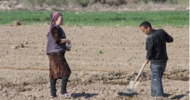In the acceptance speech for the 2011 ‘Alternative Nobel Prize’, GRAIN demands an immediate end to land grabbing and a restitution of lands to local communities.
Myriad small farmers in Africa are being set up to fail by multinational corporations that end up assuming their land, a Canadian professor says.
Corporate agriculture is not about food production or satisfying the needs of the undernourished or downright starving but about producing profit. How long can it be before its limits are reached?
- worldsocialism.org
-
11 November 2011
The Ministry of Agriculture has signed a 23.7 million Br land lease contract with Toren Agri Plc, a Turkish company, for large scale production of cotton at its head quarters at Asmera road
- Voice of Gambella
-
15 October 2011
Victims of "land grabbing" have joined 800 of the world's leading environment and development groups to press the UN to establish strong guidelines to protect communities affected by large-scale land investments.
- The Guardian
-
14 October 2011
Pour expliquer la crise alimentaire dans la Corne de l'Afrique, on évoque la sécheresse, l'instabilité politique, le manque d'efficacité des systèmes d'alerte... Qu'en est-il de l'impact de l'accaparement des terres ?
- Deutsche Welle
-
13 October 2011
The MoA has identified a total of 2.6 million ha of land fit for cultivation of cotton, which is equivalent to what Pakistan, the fourth largest cotton producer in the world, uses for the same purpose.
Karuturi Global Ltd. is to construct embankments around 25,000ha of farmland, half the size of Addis Abeba, in Gambela, at a cost of US$15 million, following its report of a loss of US$15 million due to flooding.
- Addis Fortune
-
09 October 2011
Video of the panel on land grabbing featuring the Anuak Survival Organisation, FIAN and the Transnational Institute.
Il Corno d’Africa è afflitto dalla più grave tragedia umanitaria che la sua storia ricordi. Siccità e fame, 12 milioni di persone senza cibo né acqua. Ma il “neocolonialismo agricolo” procede indisturbato.
- Il Fatto Alimentare
-
08 September 2011
Les affaires sont les affaires: des entreprises indiennes d’agroalimentaire sont prêtes à investir plus d’un milliard d’euros en Ethiopie, Tanzanie et Ouganda
- Slate Afrique
-
26 August 2011
When it comes to famine in Africa, China seems an easy target for critics of its rising outbound investments.
- Wall Street Journal
-
25 August 2011
Nirmal Seeds wants not more than 30,000 hectares of land in Tanzania to invest in seeds production to feed the local market.
- Tanzania Daily News
-
22 August 2011
The thriving market for land for commercial agriculture in East and West Africa is now seen as a threat to food security as rural populations are pushed off prime land.
- East African
-
07 August 2011
Germany's Africa policy coordinator on Thursday blamed China's practice of buying up land in the Horn of Africa for contributing to the devastating famine ravaging the region.
The US-based Worldwatch Institute recommends three considerations to help guide global land transactions to promote mutual benefit.
- Worldwatch Institute
-
26 July 2011
Japanese translation of article of GRAIN, "Pension funds: key players in the global farmland grab"
Pension funds may be one of the few classes of land grabbers that people can pull the plug on, by sheer virtue of the fact that it is their money.
As the G20’s agriculture ministers arrived in Paris for a two-day meeting, more than 500 non-governmental organisations from around the world have delivered a petition calling for a halt to land grabbing under the guise of “responsible agricultural investment”.
Institutions including Harvard and Vanderbilt reportedly use hedge funds to buy land in deals that may force farmers out.
Hedge funds are behind "land grabs" in Africa to boost their profits in the food and biofuel sectors, a US think-tank says
Wealthy U.S. and European investors are accumulating large swaths of African agricultural lands in deals that have little accountability and give them greater control over food supply for the world's poor
Are land and water rights for real? How can they be guaranteed in the face of the insurmountable bargaining power that big corporations seem to posses?
- Water Channel
-
06 May 2011
When land deals were first proposed, they were said to offer the host countries four main benefits: more jobs, new technology, better infrastructure and extra tax revenues. None of these promises has been fulfilled.
- The Economist
-
05 May 2011
Au cœur du problème, la grande opacité de termes des accords passés entre les Etats et les grandes firmes.
- Agrobiosciences
-
18 April 2011
Several Indian companies have planned huge investments in the African mining and agriculture sectors, buoyed by the prospects of high returns, on the back of rich resources and low labour and input costs, stakeholders maintain.
- Economic Times
-
05 April 2011
Vast tracts of farmland in poor nations being gobbled up by foreign investors could undermine small farmers' rights and food security in the host countries
A top official at UN agencies seeks to allay apprehensions among people of African countries that propose to lease farmland to investors from countries like India.
Foreign investors see Africa as a breadbasket. Done well, investment could help with African hunger but create food security for the rest of the world.
- CSMonitor
-
06 February 2011
Chadha Agro Plc, one of India’s giant operators in agro business, is set to receive 100,000 ha of Oromian land (an area nearly twice the size of Singapore country) in addition to the 300,000 ha of land given to various other Indian investors recently.
- Jimma Times
-
30 January 2011















